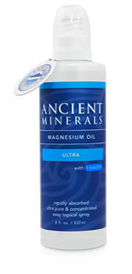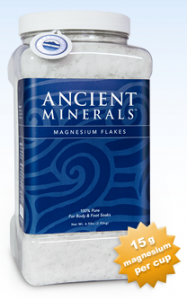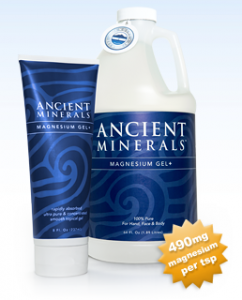Do you experience muscle cramps, facial ticks, eye twitches, or muscle spasms? What about headaches, depression, insomnia, or anxiety?
These are all symptoms of one common mineral deficiency in our system. More specifically, a magnesium deficiency.
A recent estimate concluded that 55% of the US population are not taking in the Recommended Daily Allowance (RDA) of magnesium through their diet, with 20% getting only half or less of the RDA¹.
With these statistics, it’s highly likely that we’re deficient in this vital mineral as well.
You may be asking yourself: “How do I know IF I am magnesium deficient or not? Is magnesium really that important? What are the effects or being magnesium deficient?”
Most of all, if we find out that we are indeed deficient in magnesium, what is the best way to get more of this mineral?
We’ll answer all of your questions and more with this article. First things first, let’s start at the very bottom of all this, how do we figure out if we’re even magnesium deficient?
>>Already Know The Importance of Magnesium? Get The Best Magnesium Supplement Here<<
Tell-Tale Signs Of Magnesium Deficiency
The first thoughts that comes to most of our minds might be to see our doctor for a check up and ask if our magnesium levels are alright.

What we end up with is a blood serum test, which is the standard clinical test used to detect levels of magnesium in our body.
The flaw with this test however, is that only 1% of the entire body’s magnesium is found in the blood, with only 0.3% found in blood serum.
So unless we want inaccurate readings indicating that we’re magnesium deficient in every way possible, we’ll get much more accurate results with these methods.
Not to mention they’re completed free.
Beverage Intake
Do we consume any of these beverages on a regular basis?
- Carbonated beverages (soda, other phosphate-laden drinks)
- Caffeinated beverages (coffee, tea, energy drinks)
- Alcohol
The problem with carbonated beverages is the phosphate content. While carbonated water typically doesn’t have any phosphate included in it, all sodas and other carbonated soft drinks usually contain this mineral.
Phosphate binds to magnesium within our digestive tract. This makes it impossible for our bodies to absorb the magnesium that are binded, and it passes in our stool and urine.
We’re basically flushing magnesium out of our bodies by continually consuming phosphate-laden beverages and foods.
>>Still Have Your Coffee And Drink It Too! Supplement With The Best Magnesium Here<<
Caffeine lovers are not going to like this next one.
Our kidneys are responsible for filtering and releasing excess magnesium from our body. The high intake of caffeine ends up causing our kidneys to release excess magnesium.

Just like phosphate-laden drinks, caffeine is in effect clearing out whatever magnesium we have within our body.
Excess alcohol intake (think average of more than one drink per day) has the same effects on the kidneys as does caffeine.
In addition, excess alcohol intake is often associated with a less efficient digestive system, which means all mineral and nutrients, including magnesium, cannot be absorbed as efficiently.
Vitamin D levels are also found to be lower in those with excess alcohol intake, which contributes to lower magnesium levels as well.
None of that is really surprising given that magnesium deficiency is found in over 30% of alcoholics.
>>You Can Still Have Your Drinks As Long As You’re Supplementing With This!!<<
Food And Supplement Intake
Do we consume sweets, candy, pastries, cakes, desserts, and other junk foods regularly?
Even if we only have these sparingly, we’re most likely still leaching magnesium from our body in the process.
This leaching process happens in 3 different ways:
- Much like alcohol and caffeine, these types of foods causes our kidneys to excrete excess amounts of magnesium
- These foods in themselves are devoid of ANY magnesium, having been refined and processed
- These foods takes up nutrients and minerals during the digestion process
Point 2 and 3 are linked in that Point 3 applies to ALL foods that we eat. Whenever our body needs to digest, it requires energy, nutrients, minerals, etc. to complete that process.

Quality, whole foods has enough nutrients in them to offset the “required usage for digestion”. But when we eat processed, refined sweets that are empty in nutrients, we’re using up our own sources of nutrients, including magnesium, and getting nothing back from it.
The one supplement that can be dangerous for maintaining healthy magnesium levels is calcium.
When our bodies are deficient in magnesium, it tends to hold on to calcium at all cost. This is likely the case for most that are supposedly “low” on calcium.
Taking calcium supplements in this case will only disrupt the delicate balance between magnesium and calcium in our cells and organs even more.
This makes it even harder for us to absorb the magnesium our body so desperately needs, creating a vicious cycle of plummeting magnesium levels.
>>Don’t Want to Ditch The Calcium? Take The Best Magnesium To Balance Everything Out!!<<
Surgery And Medication
Stress in general, either physical or emotional, places a toll on the body. Our magnesium levels are no exception.
Stress in all its forms can cause a magnesium deficiency if we’re not careful. Whether it’s a physical stress like a recent surgery, broken bones, burns, or emotional stress like deadlines from work or death of a loved one, our magnesium levels are compromised when we undergo these situations.
Certain medications are known to deplete our magnesium stores. I’m not in any way advocating that we ditch our meds in favor of maintaining our mineral levels.
But it’s important to weigh out the risks with each.
Here are some of the common medications that are known to lower magnesium levels²:

- Antibiotics (Garamycin, Carbenicillin, Ticaricillin, Tobramycin, Amphotericin B, Tetracycline Class)
- Pentamidine
- Synthetic Estrogen
- Corticosteroids
- Diuretics
- Heart failure meds (Digitalis, Qunidex, Cordarone, Digoxin)
- Anti-Cancer drugs (Platinol, Neoral, Sandimmune)
- Antineoplastics
- Chemotherapy and Radiation
- Asthma meds (Epinephrine, Isoproterenol, Aminophylline)
- Antipsychotic drugs (Pimozide, Mellaril, Stelazine)
These are just a few that depletes our magnesium to unsafe levels.
>>Have To Stay On These Drugs? Do Your Health A HUGE Favor With The Best Magnesium Here<<
Experiences
There are various neurological and physical symptoms that indicates our magnesium levels are not where they should be. If we experience any of these symptoms, it most likely means we’re magnesium deficient.
- Anxiety
- Burst Of Hyperactivity
- Trouble falling asleep
- Trouble staying asleep
- Muscle spasms and cramping
- Fibromylgia
- Facial ticks and eye twitches
Magnesium is essential in proper nerve conduction, and an imbalance in electrolytes occurs when we’re magnesium deficient.
This can cause the neurological problems mentioned, including depression.
Calcium and magnesium work side by side to regulate the contraction and relaxation of our muscles. Without adequate magnesium, our muscles can’t relax properly, leading to bouts of spasms, cramps, and twitches.
Age
Those of us more advanced in years have decreased digestive efficiency, which means less nutrients and minerals are absorbed from our foods, including magnesium.
The level of magnesium deficiency are more pronounced in those 55 years young or older compared to those younger in years.
The causes of magnesium deficiency mentioned above affects them to a greater extent as well.
>>Don’t Let Your Lifestyle Or Age Stop You, Feel Young And Alive Again With Magnesium<<
Benefits Of Magnesium
I’ve made it clear at this point the importance of getting enough magnesium.
But I don’t want your motivation to be out of fear for all the side effects and illnesses that comes with magnesium deficiency. Instead, think of all the benefits that magnesium to bring into your life. Just to name a few³:
- Maintains proper muscle relaxation and heart health
- Regulates messages sent between the brain and our nervous system
- Aids the body’s use of calcium and other minerals
- Maintain cell membranes’ structural health in our body
- Assist in DNA prescriptions, energy production, and synthesis of proteins
- Modulate insulin sensitivity and regulate cholesterol production
- Regulates metabolism of macronutrients
- Assist in bone and teeth formation
- Increased energy levels and mood
- Increased athletic performance

The benefits doesn’t just stop there. Sufficient magnesium levels prevents diseases like osteoporosis and hypertension. Not to mention that unlike prescription drugs, magnesium can be stored in our body for later use.
Yes, you read that right. Magnesium not used at the time can be stored away and used later by our body for its regular functions.
>>Know Your Dosage With The Right Type Of Magnesium Supplement, Click Here<<
Different Ways Of Getting Magnesium
With all the benefits of magnesium laid out, the next question in line is obviously how do we get more magnesium into our system?
I mean, do we just rely on the foods we eat? Or should we look at capsules or pills from supplement stores? Are they even necessary?
Consider the statistic mentioned at the beginning of the article. Over half of the US population is deficient in magnesium according to the current RDA. There have been talks among medical researchers to DOUBLE the current magnesium RDA to prevent illnesses like osteoporosis and hypertension.
So the current RDA might not even be enough, and in just one country, we have over 150 million who are under that amount. Then we have another 60 million people, 20% of the US population, who are getting LESS THAN HALF the current RDA.
I’m not sure about you, but this tells me that magnesium intake needs to be amped up, BIG TIME.
Supplementation Required
Of course, the first thought is getting more magnesium through our food. This is perfectly logical until we see that thinking is the contributing cause of the magnesium deficiency we see today.
People are constantly reminded to eat more greens and other magnesium rich foods to boost their levels.
Yet, we don’t exactly see it working do we?
>>Doing For You What Foods Cannot When It Comes To Magnesium<<
Supplementing with magnesium is a definite must in our society today. It’s tough enough for those of us in good health to get enough magnesium through food.
The rest of us that might be under a lot of stress, taking certain medications, or consumes not-so-healthy foods on a regular basis are pretty much automatically magnesium deficient.
When it comes to magnesium supplements, there are mainly 2 types: oral and transdermal.
Oral Supplementation
Oral magnesium supplements usually come in the form of a capsule. The most type of oral magnesium supplement is is in the form of magnesium oxide.
Although this is the cheapest in cost due to its abundance, it’s also the lowest in terms of bioavailability. Some studies have shown that only 4% of magnesium oxide is actually absorbed by our body4.
Next, we have a series of magnesium acid complexes that are made in a lab. These are labeled “organic”, but don’t be fooled.
The “organic” label is slapped on there based on the definition of organic chemistry. There’s nothing agriculturally organic about these magnesium acid complexes made in a laboratory.
Some of these “organic” magnesium supplements include:
- Magnesium Ascorbate
- Magnesium Aspartate
- Magnesium Citrate
- Magnesium Fumarate
- Magnesium Gluconate
- Magnesium Glutamate
- Magnesium Lactate
- Magnesium Malate
- Magnesium Pidolate
My personal advice, stay away from these man-made synthetic magnesium supplements. There are only a handful of natural elements in this world that are actually better for us after going through a man-made refining process.
>>Not Looking Too Promising? Don’t Worry, Here’s THE Magnesium You Should be Taking<<
I highly doubt magnesium is one of them.
Next on the list is amino acid magnesium chelates. These are also made in a lab through a complex chemical process that bonds magnesium to amino acids.

Because of the expensive chemical process required to manufacture these, the end product turns out to the most expensive form of magnesium supplementation as well.
Since it relies on protein pathways for bioavailability, it’s absorbed by the body more efficiently than magnesium oxide or the mentioned synthetic magnesium forms.
But there is one form that beats the pants off all of these.
Transdermal Supplementation
Magnesium Chloride is the most bioavailable form of magnesium known to man. This form of magnesium surpasses even that of the costly amino acid magnesium chelates.
The purest form of magnesium chloride are mined from the ancient Zechstein Sea, which comes in the form of a mineral salt.
It has extremely high solubility and bioavailability, so our bodies can absorb this form of magnesium no problem.
>>Ready For the Best Transdermal Magnesium Supplement? Find Out Here!<<
Comparing oral supplementation vs. transdermal supplementation, there really is no comparison. But for the sake of putting it together, here’s a brief comparison (I had to do it):
Oral Supplementation
- Most brands uses magnesium oxide (as low as 4% bioavailability)
- The remaining brands uses synthetic, chemical process to manufacture their supplements, some of which has found to be a neurotoxin when broken down and not bound to an amino acid
- The more bioavailable brands are the most expensive out of ALL magnesium supplementation
- Caused digestive problem for some including diarrhea and loose stools
Transdermal Supplementation
- Uses magnesium chloride, the most bioavailable form of magnesium known to man
- Comes in various forms for transdermal applications, as we’ll discuss below
- Better in quality and cheaper in cost than oral magnesium supplements
- No digestive issues whatsoever
It’s a no brainer at this point that if when we supplement with magnesium, transdermal supplementation is the definite way to go.
Out of the few products available right now (and there are only a few that are trustworthy), one of them stood out as the winner among the rest.
Ancient Minerals Magnesium Supplement
Introducing Ancient Minerals Magnesium Supplement, where its transdermal application comes in all the forms we may need for whatever accommodations we can think of.
Needless to say, Ancient Minerals Magnesium supplements only uses magnesium chloride mined from the ancient Zechstein Sea bed.
I know you’re dying to see what they have to offer, so here they are.

With 560 mg of magnesium chloride per teaspoon, Ancient Minerals Magnesium Oil is the gold standard for magnesium supplementation.
Go with the Ultra version of the magnesium oil, which includes MSM with the oil to increase cell permeability, enhancing the bioavilability even more!
Of course, the Ultra is the same price as the regular so… it’s a no-brainer for me.
It comes with a fine mist spray bottle for easy application. Simply spray into our one cupped hand a 2 or 3 sprays, then rub over our body.
2. Ancient Mineral Magnesium Bath Flakes

With 15 g of magnesium choride per cup, 1-3 cups of magnesium flakes in a warm bath is the perfect way to relax and soothe our skin.
This product is perfect for those with sensitive skin and cannot apply topical magnesium supplements directly.
Because we’re soaking in magnesium rich water, Ancient Mineral Magnesium Flakes are highly effective for healing skin conditions such as psoriasis, eczema, and dermatitis.
3. Ancient Minerals Magnesium Gel

This next one is a personal favorite of mine. The Ancient Mineral Magnesium Gel delivers all the same skin healing properties as the bath flakes, but can be applied directly to the skin for those that can handle it.
It is my choice of massage gel when I go for a massage. Not only am I getting a soothing, relaxing massage, but I’m getting my dose of much needed magnesium.
The fact that magnesium relaxes my muscles makes the massage feel that much better. It really is a feeling to be experienced.
With 490 mg of magnesium per teaspoon, the gel includes certified organic aloe vera extract that has both topical and cosmetic applications.
I found if I ever break out with acne, a simply application of this gel makes them go away within the day.
4. Ancient Minerals Magnesium Lotion

The last of Ancient Minerals Magnesium Supplements is the magnesium lotion.
At the much lower concentration of 185 mg per teaspoon, the magnesium lotion is perfect for those with the most sensitive skin.
It can also be used for massages, keeping exposed body parts moisturized during dry winter months, and promotes healthy skin tissue.
Combined with organic plant moisturizers like coconut oil and shea butter, our skin is hydrated without feeling greasy or waxy afterwards.
Ready to make the change towards better health, sleep, mood, mind, well-being, athletic abilities, recovery, and a whole lot more?
Get your own supply of THE BEST magnesium supplement here: Ancient Minerals Magnesium Supplements.
Have you tried magnesium supplements before? How has it worked for you? What was your experience?
Let me know in the comments below!
Stay healthy,
-Wing
References:
- http://www.ancient-minerals.com/magnesium-deficiency/need-more/
- http://www.ancient-minerals.com/magnesium-deficiency/causes-depletion/#medications
- http://www.ancient-minerals.com/magnesium-benefits/
- http://www.ancient-minerals.com/magnesium-supplements/
- http://www.ancient-minerals.com/transdermal-magnesium/

